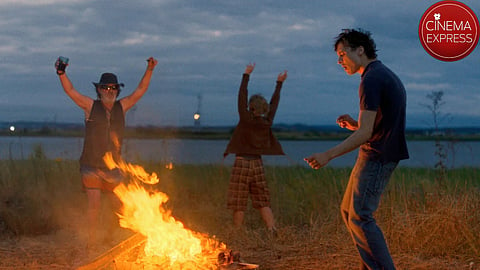

A lot of the viewers would identify Harris Dickinson, the young actor, for the decadent, materialistic world of the rich and famous that he inhabited as model Carl in Rubin Ostlund’s Triangle of Sadness (2022) or as the diabolically cute young intern Samuel, seducing his boss Romy Mathis (Nicole Kidman) in Halina Reijn’s exploration of dangerous liaisons in the corporate setting in Babygirl (2024). However, as a director, Dickinson goes into a diametrically opposed terrain of the underprivileged. More in line with Charlotte Regan’s Scrapper, which won the Grand Jury Prize for the World Cinema Dramatic competition in Sundance 2023 and in which Dickinson played an estranged, young, indigent father, Jason, trying hard to strike an equation with his daughter Georgie (Lola Campbell) after her mother’s death.
Dickinson’s debut feature film Urchin lives up to its name. It's a character study of a hobo Mike (Frank Dillane) who barely manages to get by, living on the streets of East London. A violent incident lands him in the prison but a subsequent restorative justice session and rehab also offer an opportunity to work—as a chef and then as a cleaner—and socialise, get over the fits of anger to bond with colleagues and forge friendships, find a home and home in on himself. Will he be able to accomplish that? Will he give up being an unmoored wastrel and redeem himself? Will the tramp start over and take a shot at the second chance that life is offering him?
The film premiered in the Un Certain Regard section of Cannes Film Festival winning the FIPRESCI Critics prize for Dickinson and Best Actor award for Dillane.
As a first time director Dickinson follows the footsteps of the likes of Ken Loach and Mike Leigh. Urchin is a kitchen-sink drama about the homeless. It’s not populated with bright, shiny, happy faces but by the have-nots living on the margins. In fact, they aren’t just at the bottom of the hierarchy but entirely invisibilized and rendered inconsequential for the majority. The idea emerged from Dickinson’s own volunteer work with people dealing with homelessness and addiction and he gets things spot on right from the first shot of eating at the charity truck. The film is raw and rough, both in its setting and its craft. It does tread on familiar territory, offering few surprises in terms of the story or its telling. In fact, it gets weighed down quite often by the plodding pace, staccato rhythm, a theatre-like stylised staging of scenes and sequences and the odd tonal shifts between social-realism and the surreal workings of Mike’s mind.
What helps is that sordidness is accompanied by some wonderfully hopeful moments. The film doesn’t wallow in indigence. The serious social commentary is balanced by a fine thread of humour, like a ray of sunshine in the midst of the clouds.
It’s the characters that win the day, as do the actors essaying the roles, including Dickinson himself as Mike’s street pal Nathan. At the end of the day, it’s Dillane’s show all the way. He is forever charming as Mike despite the underlying angst. He elicits audience empathy even in his wickedness and despite our collective exasperation at his own self-destructive ways. He is as vulnerable as he is volatile. Urchin doesn’t offer any clear answers. The struggle for survival remains in a continuum. What makes the film hold together well is Dickinson’s non-judgmental, compassionate, humanist approach to his people. There are no villains here. If there’s a bad guy in his scheme of things it’s the system and the social disquiet it engenders. Urchin may not be a trailblazer but certainly makes for an impressive, earnest debut.